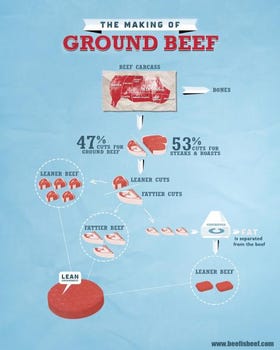Update on BPI lawsuit against ABC
October 12, 2016

Four years ago, the term “pink slime,” regarding BPI’s lean finely textured beef (LFTB) products resulted in a media frenzy that rocked the nation and resulted in school lunch programs, fast food joints and grocery stores pulling the safe, 100% beef, USDA inspected product from their inventory.
If you recall, ABC’s Diane Sawyer and Jim Avila reported on “pink slime,” which BPI blames for the closing of three of its plants and 700 workers losing their jobs.

Photo Credit: BPI www.beefisbeef.com
Fortunately, the fear-mongering died down, the industry responded with facts about LFTB, and people moved on to the next thing; however, BPI was left reeling in the aftermath and filed a $1.2 billion defamation lawsuit against ABC, Sawyer and Avila.
Fast-forward to 2016. In recent news, Sawyer and Avila are asking a South Dakota judge to dismiss the lawsuit, citing that they were simply answering viewer’s questions about this product and that they weren’t the ones to coin the phrase “pink slime.” Instead, they say the term was actually the description offered by former USDA scientist Gerald Zirnstein, who not surprisingly, is against the product.
BPI argues that ABC’s reporting on LFTB was “a month-long vicious, concerted disinformation campaign against BPI,” according to the Washington Post.
In an affidavit filed Monday, Sawyer writes, “My sole interest was to help the consumer by providing information to our viewers. I thought that our reporting might result in consumers getting more information from their grocers or might result in some form of labeling that would facilitate consumer choice. I was surprised when supermarket chains decided to discontinue use of BPI's product altogether.”
According to the Daily Mailer, “In August, the judge hearing the case signed off on the dismissal of five defendants: ABC's news division; correspondent David Kerley; USDA microbiologist Gerald Zirnstein, who named the product 'pink slime;' former federal food scientist Carl Custer; and Kit Foshee, a former BPI quality assurance manager who was interviewed by ABC.”
Additionally, the NAFB News Service reports, “Court documents recently filed by ABC argue the work was done in the public’s interest as consumers were unaware that the product, at the time, was present in 70% of the ground beef sold in supermarkets.”
The case is set to go to trial in June, but in the meantime, the industry should be ready to answer any questions about LFTB should they arise. Since Sawyer and Avila are asking for this trial to be dismissed, this will certainly make the rounds in the news again this week, so take a minute to read the facts about LFTB from BPI’s beefisbeef.com website. You can view the common questions and answers about this product here.
Do you think BPI should be rewarded the $1.2 billion for defamation? Or should the case be dismissed? Share your thoughts in the comments section below.
The opinions of Amanda Radke are not necessarily those of beefmagazine.com or Penton Agriculture.
You might also like:
Young ranchers, listen up: 8 tips from an old-timer on how to succeed in ranching
13 utility tractors that will boost efficiency in 2016
Burke Teichert: How to cull the right cow without keeping records
You May Also Like



